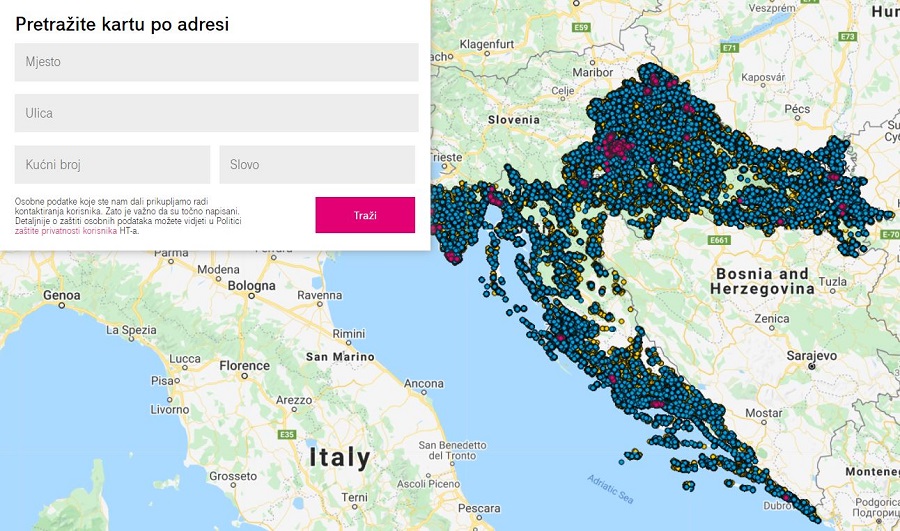If You Want to Save Others, Put Yourself First: An Interview with Josip Granić, Head of Croatian Mountain Rescue Service
June 12, 2021 - Croatia is often described as one of the safest countries in the world. However, even if no danger will come to them, many people will still actively seek it - with disastrous consequences. To discuss this phenomenon, we sat down with Josip Granić, the youngest head in the history of Croatian Mountain Rescue Service (CMRS) a volunteer, nonprofit organisation which in 2020 celebrated the 70th anniversary of its founding.
In 2007, this Split-born CRMS instructor, dog handler, helicopter rescue trainer, and international Swiftwater and flood rescue instructor won the award 'Pride of Croatia' for saving a four-year-old boy who had wandered off into the forest near his home. During the filming of Game of Thrones in Split, he served as the marine department member, ensuring all safety protocols were being implemented when working around the sea, and acted as a rowing instructor for some of the actors. He is proud to point out that in all of its 70 years, no CMRS member was seriously injured or died in an intervention, nor did a single person who they rescued.
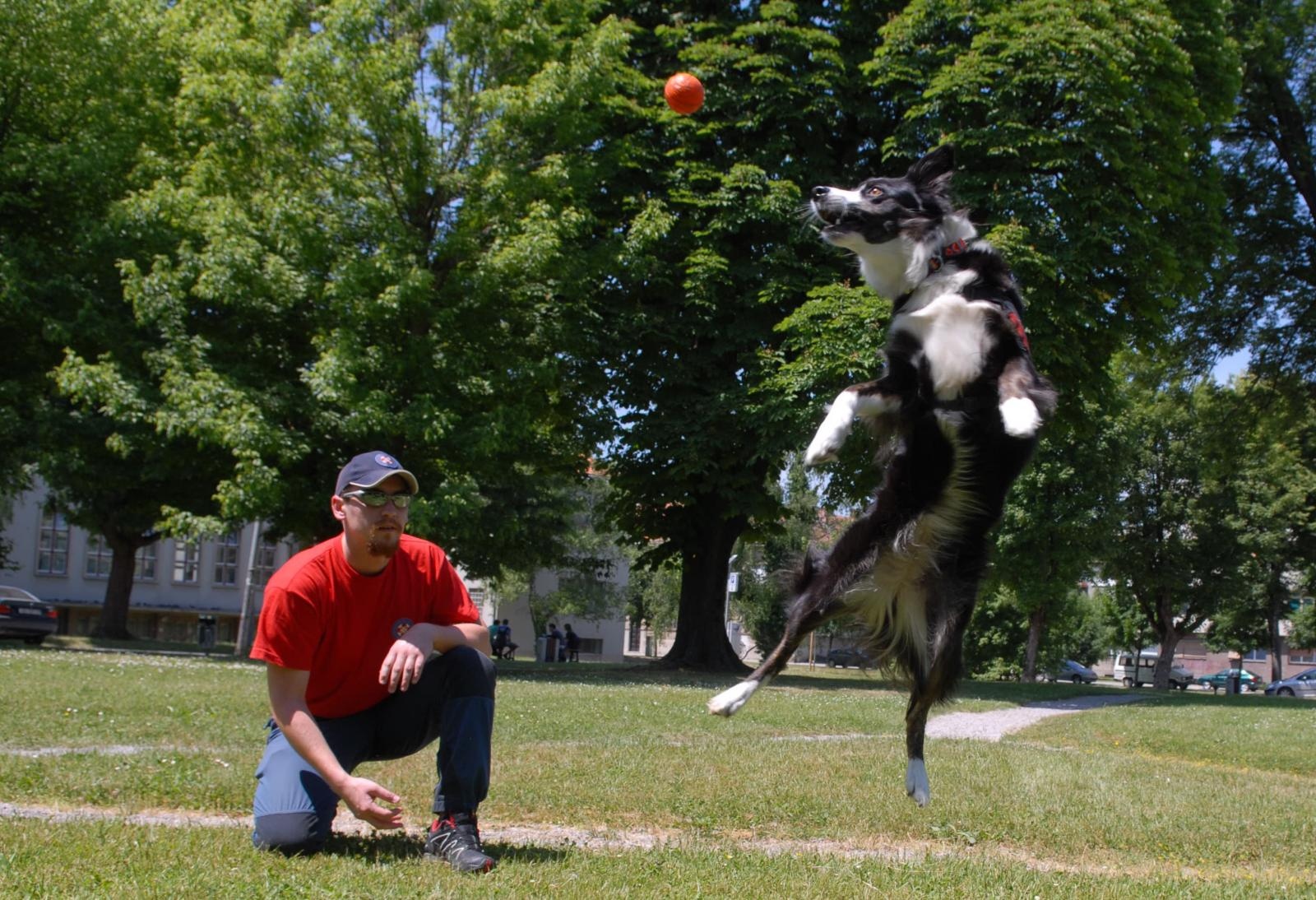
Josip Granić with Hosan, a Scottish border-collie who was involved in the rescue mission of a four-year-old boy in 2007. Hosan passed away in 2015. © Kristina Stedul Fabac/Pixsell
1. Can anyone join and become a member of CMRS? What does the process of admitting new members to CMRS look like?
In accordance with Croatian Mountain Rescue Service Statute, a potential candidate must get a recommendation of two mountain rescuers (there are several categories of members: rescuers, mountain rescuers, instructors, and so on), as mountain rescuers are, as a rule, experienced and long-term members of CMRS.
However, considering the workload and a wide variety of tasks of our organisation, we are also accepting members who had not necessarily been suggested by the aforementioned mountain rescuers.
Still, it’s important to emphasize that it is always CMR who initiates contact with potential members – and not the other way around. There are exceptions, of course, but, as a rule, we don’t accept applications.
So, the short answer would be that existing members nominate new members.
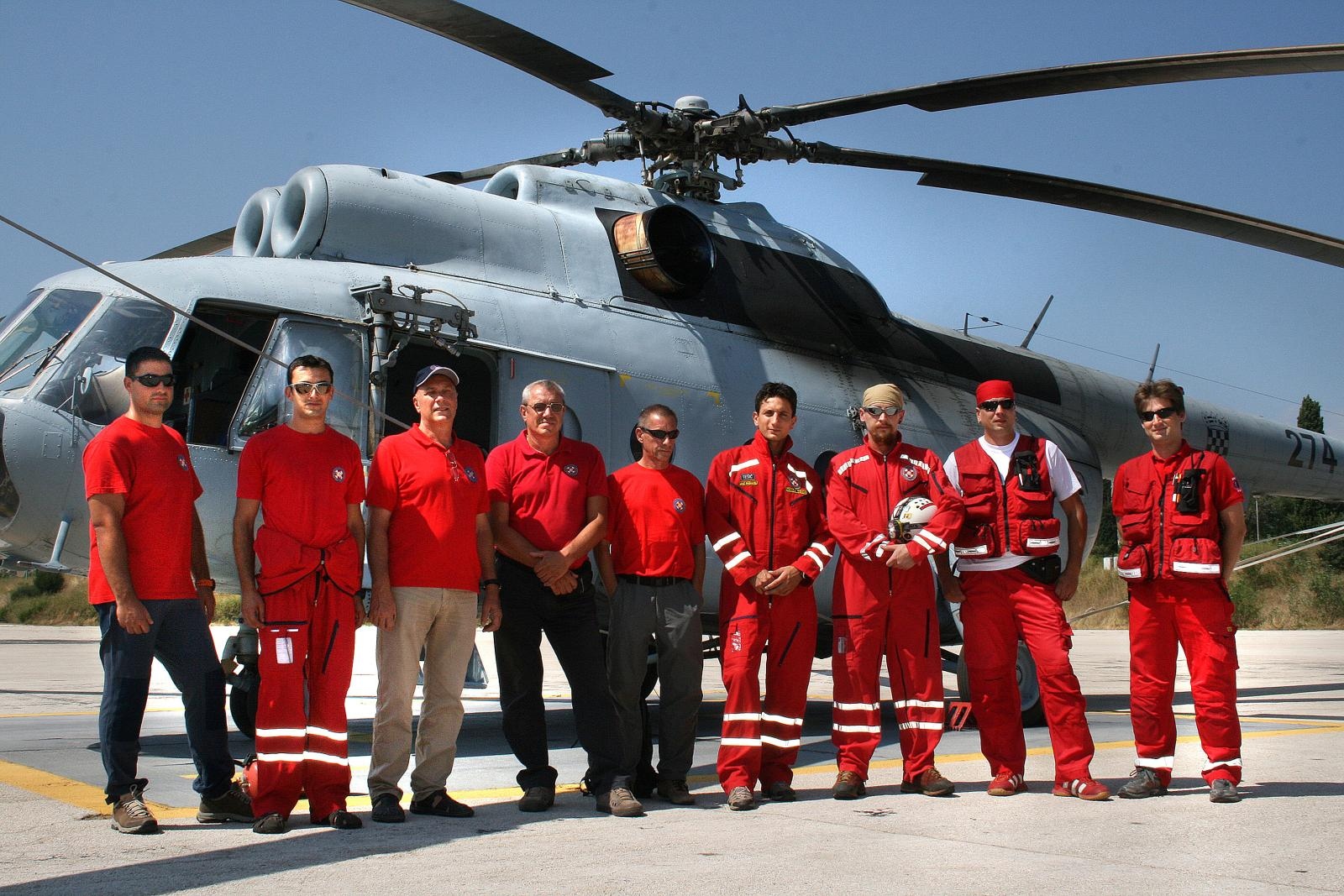
© Ivana Ivanovic/Pixsell
2. Who selects new members and according to what criteria? Are they required to have previous experience or certain qualifications?
Members are selected based on their CV – we look for specific activities which would make a person a useful addition to our organisation – hiking, speleology, alpinism, skiing – or specific knowledge we may need at the time – PR or IT skills. Those who had suggested the candidate also get a chance to tell us more about them and why they find them suitable for the position in question.
Then, all those who are present at a meeting – new members are selected at CMRS meetings - cast their vote, and the person is accepted as a member.
When it comes to essential skills we look for as an organisation (experience in hiking, alpinism, and so forth), the people we choose need to be exceptional in their field, and that generally goes for all other positions we require, such as IT experts, or medical professionals.
Then, they all go through our training which ideally lasts for two to two-and-a-half years.
There are many additional courses our members go through throughout their time with us. The process of learning never really ends for a CMRS member and all of us continually work on improving our knowledge and skills.
Our members need to be physically fit as well– we require a medical certificate which states that a person doesn’t suffer from any chronic illness which would prevent them from participating in any of our activities. And last but not least – we value and appreciate a person’s altruism and wish to do something for the benefit of the community.
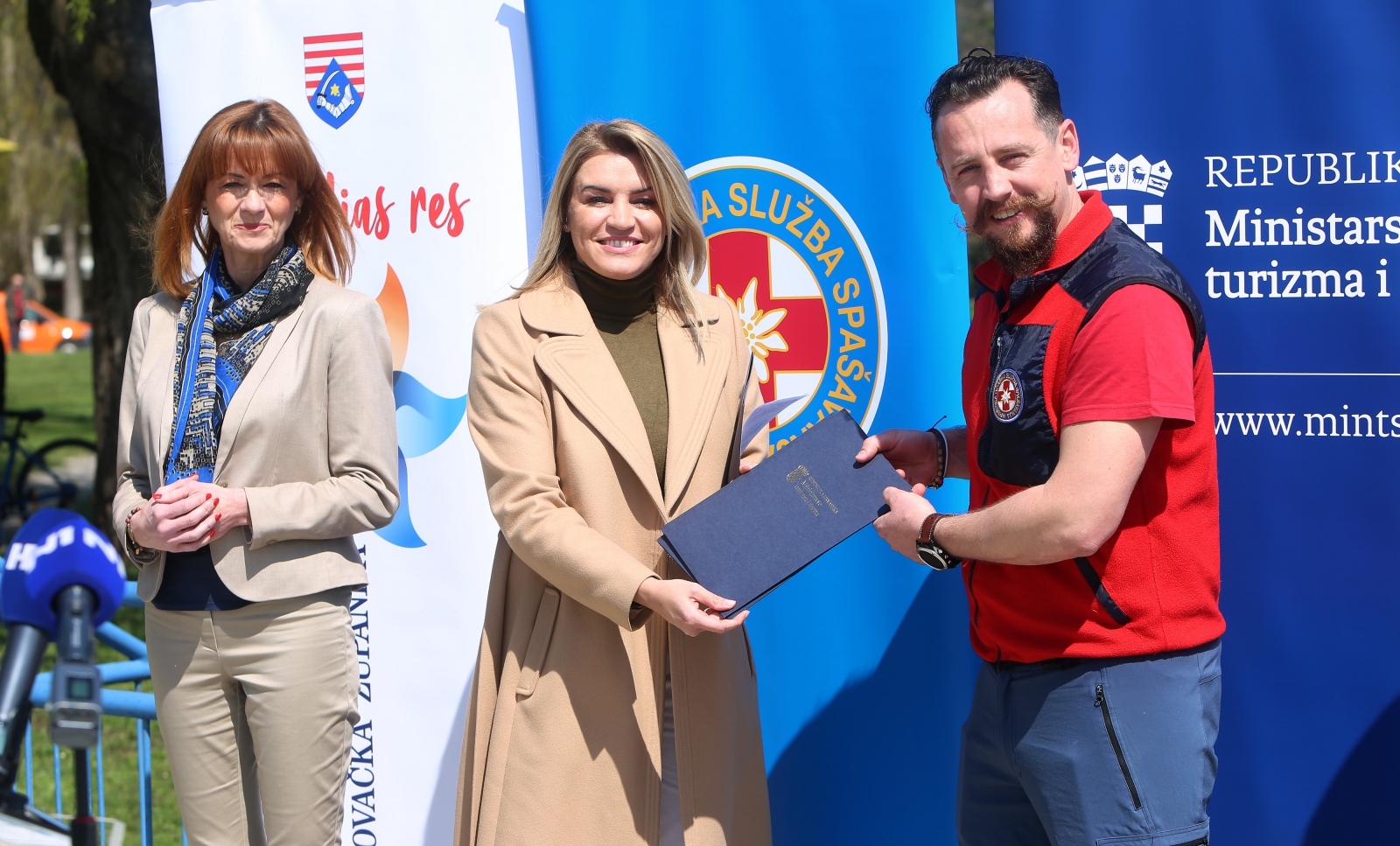
In April 2021, CMRS' Karlovac station received funding from the Ministry of Tourism. © Kristina Stedul Fabac/Pixsell
3. CMRS is a nonprofit, volunteer organization. Members donate their time voluntarily, and the CMRS does not charge for its services.
So, how does CMRS finance itself?
Exactly. CMRS is a volunteer organisation that consists of twenty-five base stations all across Croatia. Most of the work we do is free, there is only a small number of specialized watches for which the members receive compensation in the form of coverage of their expenses.
Since CMRS is a public organisation, it is funded by the state budget – the state covers larger national actions and training, our work clothes, and so on.
The twenty-five base stations are financed by the units of local self-government in accordance with Law on Local and Regional Self-Government and Law on Civil Protection System.
4. Although CMRS is most heard about in the summer, the season for CMRS lasts all year long. What else does CMRS do besides rescue operations?
Our activities are defined by the law. Aside from rescue operations, we work on prevention programs. Some of it includes working in co-operation with mountaineering associations – we mark mountain hiking trails, make tourist trail guides and maps for hiking – this way, people get lost less frequently and also get a better experience of the non-urban areas – which are, to us, especially interesting. Then, there are prevention programs and courses for the general public, different public institutions, and so on.
We also organize educational courses for adventure tour operators and tour guides.
We are involved in a wide array of different activities and rescue operations, which catch the most media interest - nothing against it, of course - are merely the tip of an iceberg, so to say.
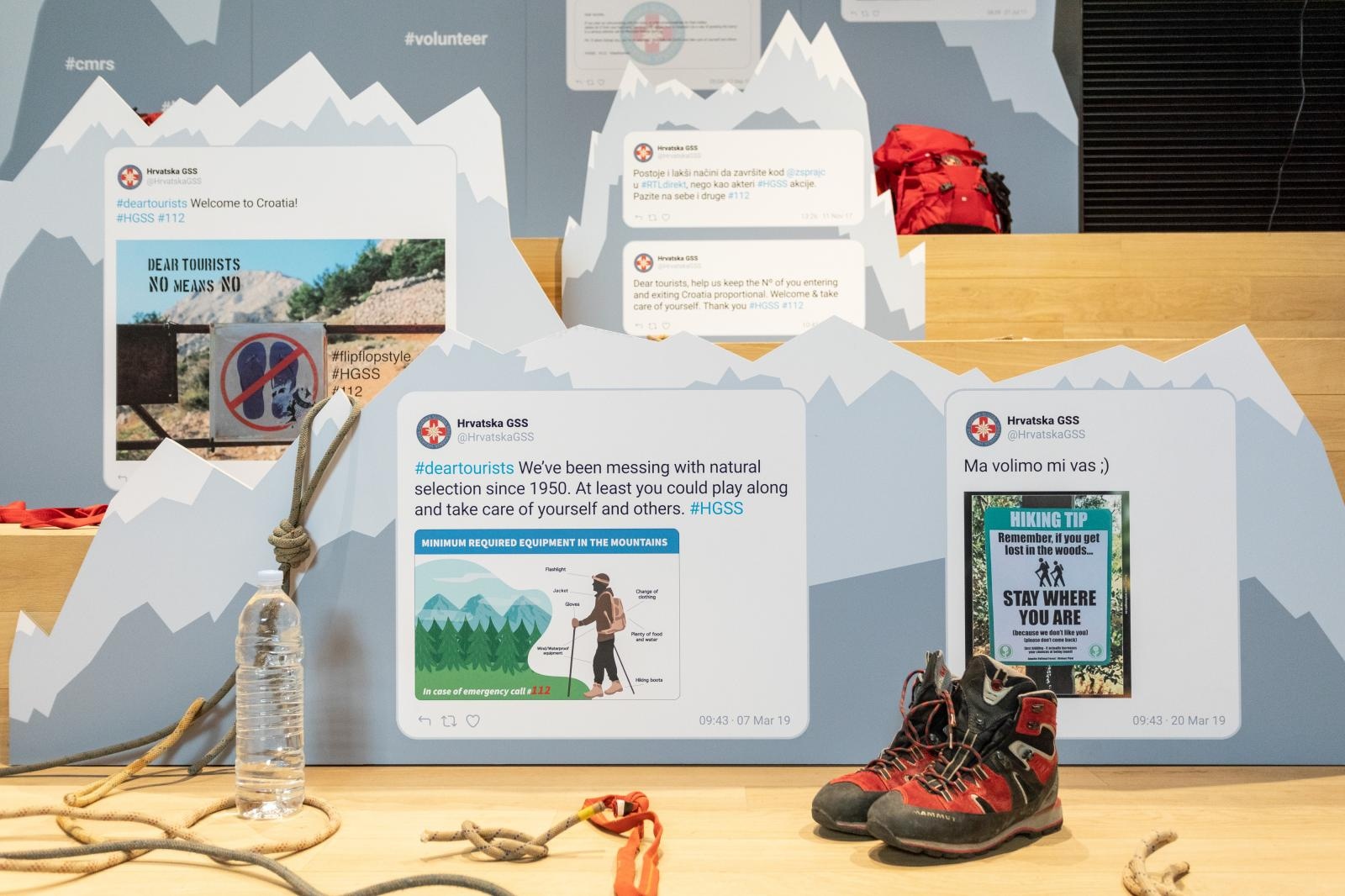
A 2020 exhibition of CMRS' tweets. © Davor Puklavec/Pixsell
5. With the arrival of the summer season, CMRS conducts educational, often humorous campaigns on social networks aimed at raising awareness of the importance of not overestimating our abilities.
Can you single out a situation that is especially etched in your memory for any reason?
Yes, we conduct these campaigns – seasoned with a lot of sarcasm and irony – because that’s, in our experience, what makes them memorable and the best way to truly get through to people.
If I were to say something generic, like ‘Don’t forget to take a bottle of water with you on your hiking trip’, it would sound boring.
As for some, let’s say, curious situations, I would single out two events – they involved my colleagues and not me personally. Once, CMRS came across a cyclist stuck in the middle of a steep hiking trail on Hvar. It was so steep in some places that it practically stood at a 90° angle. And the man had chosen to 'climb down' riding his bike. He was rescued thanks to our brilliant local team, but yes, that is one situation in which a foreigner did something, well, unexpected.
Another time, we got a call about a man who had last been seen climbing Biokovo mountain. The team came, they rescued him using a helicopter – he was very dehydrated and he started to gulp down the water they had offered him. And while we were trying to persuade him to take smaller sips, he started to explain that he hadn’t been alone - as the call we had received had indicated - and that we should go back for his father, who had presumably taken shelter behind some rock, so the team couldn’t see him upon arrival. The thing is, he didn’t say anything until the helicopter was already a significant distance away from the location they had found him at!
Interventions involving foreign tourists make up only fifteen to twenty percent of all our search and rescue operations.
The rest, about eighty percent, involve local people, but quite understandably and naturally, stories about foreigners gain more media interest.
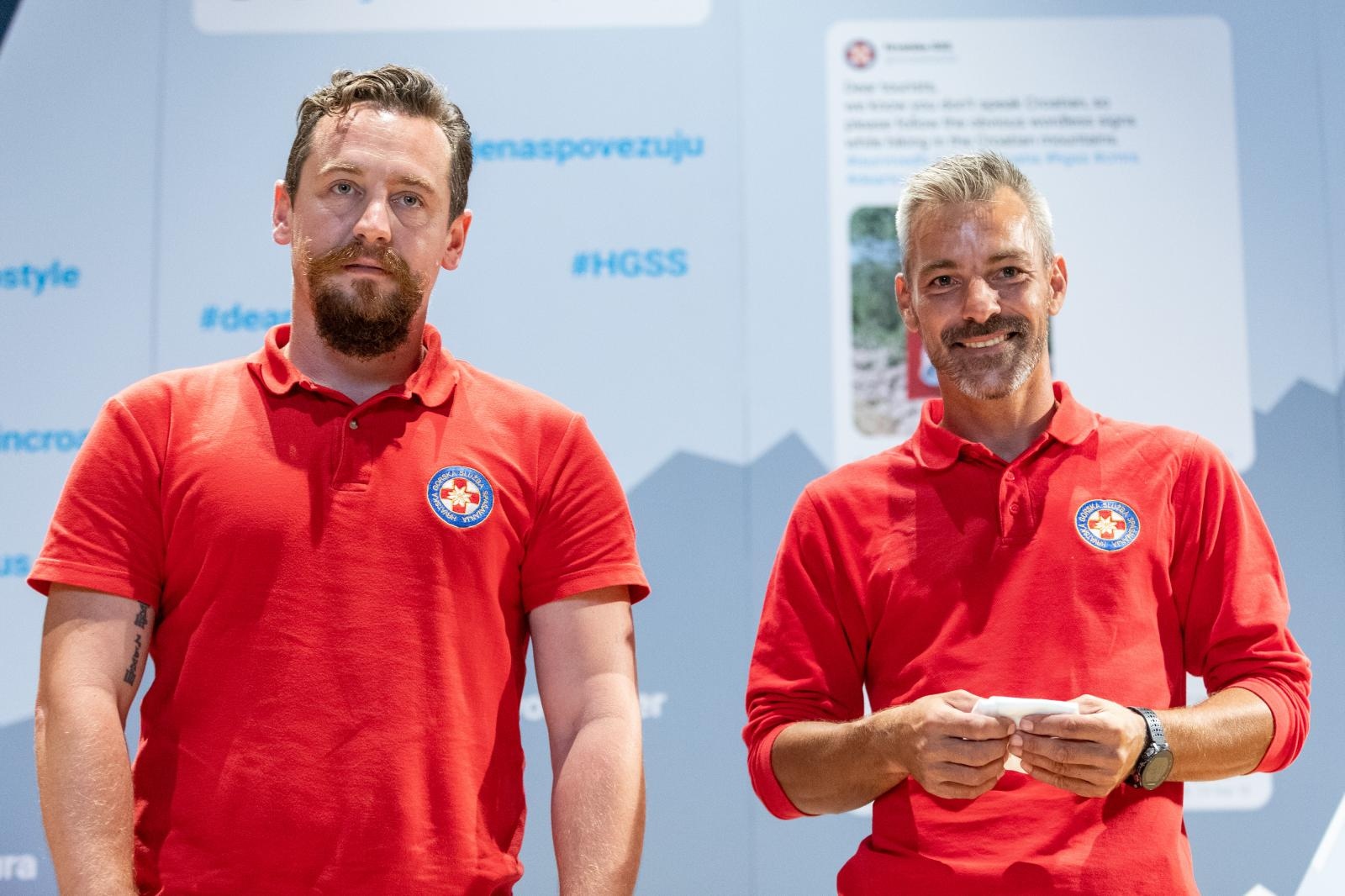
© Davor Puklavec/Pixsell
6. There is a running joke that CMRS’ tasks mainly boil down to rescuing foreigners who got stuck on a mountain because they had decided to hike in flip-flops. Is there any truth in that? Why do accidents and the need for intervention most often occur?
Like I already said, we mainly intervene in situations involving local people – but you rarely hear about an accident involving an old lady, as that doesn’t make for a sensational piece of news. The attention that the cases about foreign people attract enables us to raise public awareness and warn the people what not do.
More often than not, however, such cases turn into public campaigns which everyone uses to express their opinion of how things should be done.
The flip-flops thing is an urban – or in this case – a rural myth.
The fact is, people venture off into nature unprepared. The flip-flops case can be used as a synonym for a number of things. If you decided to climb a mountain in the middle of summer and brought only half a liter of water – it’s the same as wearing flip-flops. Or if you were to participate in Snow Queen (World Cup alpine ski race in Croatia) in the winter, wearing low-top shoes. It can’t be done.
The problem is that the people don’t educate themselves enough, don’t consult hiking manuals or look up any type of information which is easily accessible online, on the official pages of professional institutions, such as the Croatian Mountaineering Association or any other association which centers around hiking or climbing and which must stand behind what they wrote on their pages.
People - some people, that is - don’t possess certain knowledge of how to prevent an accident or what the best course of action would be. The more we know, the less likely we are to make a mistake.
Accidents happen when we overestimate our abilities and underestimate nature. The attitude ‘it’s an easy climb’ or ‘it’s not far, it’s right here, under our nose’ combined with the lack of knowledge of what to do when we get lost, get hurt, or notice something suspicious.
Accidents occur due to people’s wrong estimation in a nutshell. When I say 'a wrong estimation’, I mean that of both subjective and objective circumstances. You can’t influence certain things – such as the weather, you can’t control a storm, but you can inform yourself and know that one is coming and decide to stay home.
That, coupled with decisions made in ignorance of rules and procedures always leads to accidents.
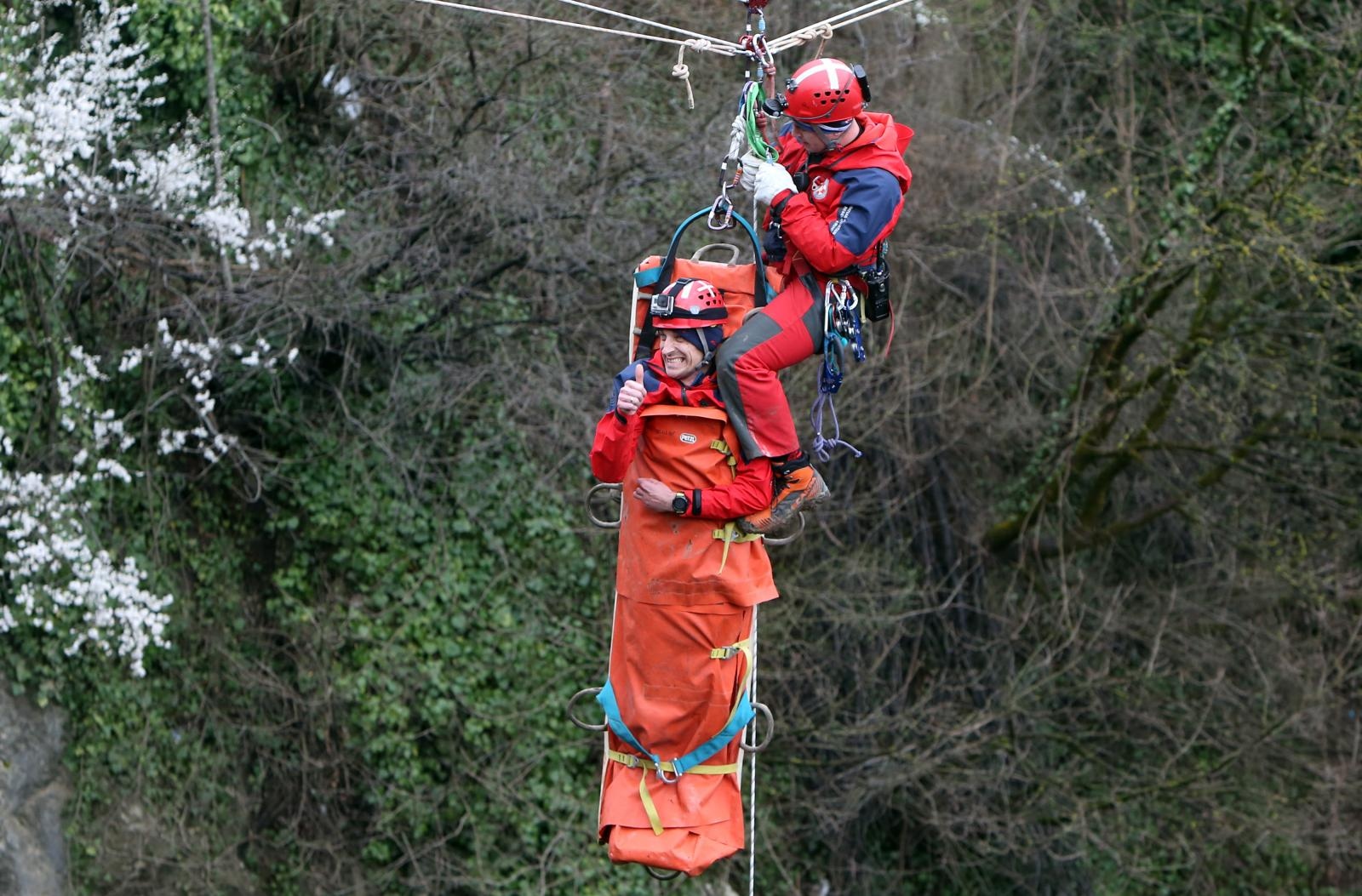
© Kristina Stedul Fabac/Pixsell
7. What does an ‘’average day’’ of a CMRS volunteer look like? Is there such a thing at all, or does each day look different, depending on the circumstances? Given that the CMRS’ headquarters are located in Zagreb, are the members expected to come to Zagreb from time to time?
Members of CMRS are volunteers. There are about forty members who are both volunteers and employees, and they perform everyday administrative tasks. When accidents occur, they must get permission from their primary employer to miss work. When they are on watch duties, they need to take time off work, use their vacation days. Rescue missions are voluntary activities that cannot be predicted and there are no set work days for that, of course. Other members who are not employed by CMRS know that they could be needed at any time. Of course, if they work as doctors, surgeons, we don't expect them to drop everything and go on search and rescue missions, but that is why we have a large membership, to make sure everything is covered. So, people are able to plan put their days, but some things (such as rescue missions) are out of our control. We work 24/7, 365 days a year.
CMRS has twenty-five base stations and one of them is located in Zagreb. If regular members come to Zagreb, they usually come to visit Zagreb's base station.
Our headquarters are where our administrative staff works, where we sort out the paperwork, plan out the EU-funded projects, and so on.
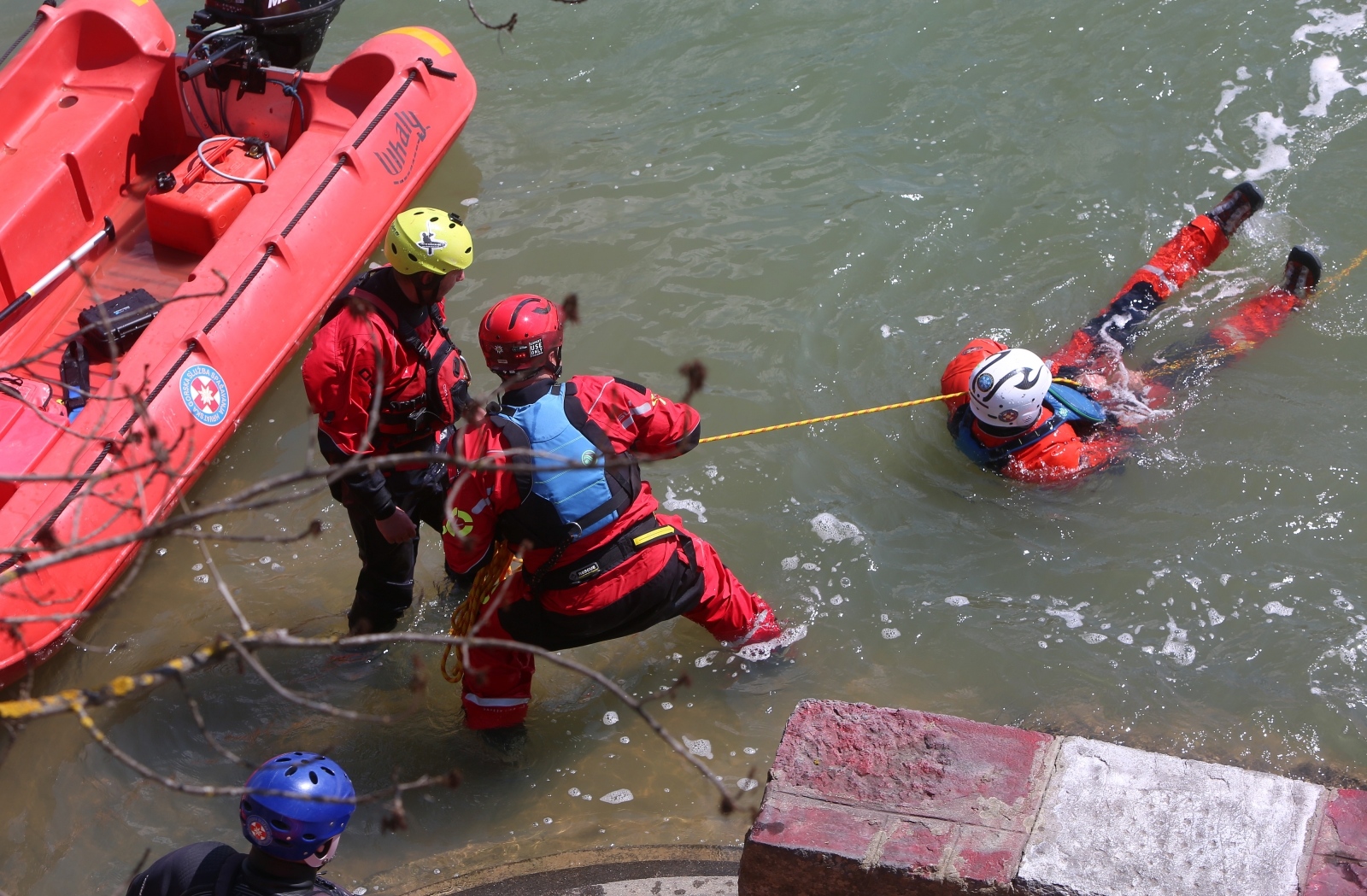
© Kristina Stedul Fabac/Pixsell
8. And finally, what piece of advice would you give to all amateur climbers and nature lovers out there who, with the arrival of nice weather, are starting to make plans to embark on adventures across our beautiful Croatia?
My message to everyone – regardless of how experienced or inexperienced they are, would be, ‘put yourself first’. Always. That means ‘put your safety first’. If you do that, if you think about what to do to make your safety a priority, it will help us, too. That is also the maxim of the Croatian Mountain Rescue Service: I put myself first, my team second and the injured person last. The reason for this is simple. If something were to happen to me, then my team can’t concentrate on the injured. By putting ourselves first, we are actually helping the person who needs to be rescued.
However, in the best-case scenario, there is no need for our intervention because the person has prioritized their own safety and taken the time to inform and educate themselves. And to us, that’s great. There is nothing we like more than when we are ‘’out of work’’. We are most glad when our role is to conduct educational workshops and other activities which don’t include search and rescue operations.
Put yourself first, stay informed, don’t overestimate your abilities – look up and observe the sky, see if there are clouds coming your way, what kind of wind is blowing, those basic things. It’s relatively easy to see what kind of weather one can expect. But, if you lack knowledge or information, you can always ask locals or check the website of the Croatian Mountain Rescue Service, the Croatian Mountaineering Association, or any other mountaineering or hiking association. Stay safe and act responsibly, that’s the key.
For more about made in Croatia, follow TCN's dedicated page.
For more about Croatia, CLICK HERE.
Croatia National Football Team's BLM Controversy and Historical Context
11 June, 2021 - The recent controversy over the Croatia National Football team has to do with the Black Lives Matter movement (BLM). It gives us an opportunity to take a look back into the history books and get some context.
There is nothing the media likes more than a bit of controversy. The Croatian Football Federation and the country’s national team are well aware of this. They recently came under a bit of scrutiny when it became known that the players will not be taking a knee before the game against England this Sunday.
EURO 2020 is upon us and it will dominate the news around the continent for the next month or more. Some of the first titles to appear to have to do with the Black Lives Matter movement and the symbolic gesture seen mostly on the British football fields. Following some American athletes, football players in England started kneeling before the games in support of the BLM movement. Sometimes teams from other parts of Europe join in and sometimes they don't. The Croatian National Football team caused a stir during their last friendly match against Belgium. The Belgian players took a knee at the beginning of the match, and the Croats didn't. While the national football association (HNS) pretty much explained everything in their statement released a few days ago, this situation gives us a chance to talk about the underlying cause of the entire issue – the fight against slavery.
Croatian Heritage
Slavery, one of the most shameful activities in human history, has a long and sad tradition. So does the fight against it. While all the countries in the world have abolished slavery, it is by no means completely eradicated. We're still seeing human trafficking and slave labour across many parts of the world. To find out how to fight against it, we might want to look at some successful historical examples. The most important one might be the Dubrovnik Republic, the first European country to abolish slavery. Yes, the southernmost part of Croatia was once its own country in many ways, officially starting from 1358 and lasting until 1808. During this time, this small republic became one of the most successful city-states of the entire Mediterranean. The Dubrovnik Republic's large and powerful merchant navy and excellent diplomatic skills allowed them to thrive in a politically turbulent area.
The Dubrovnik Republic’s Decision
At the peak of its power, in 1416, this aristocratic European merchant force voted in favour of a law prohibiting slavery and the slave trade. It was a remarkably interesting decision and one they had all the intention of keeping. The Dubrovnik Republic was a no-nonsense place when it came to laws and regulations. The punishments for transgressions were swift and serious as we already talked about in a related text. Anyone caught selling or buying a slave would have to pay reparations and would be imprisoned in the toughest prison cells for six months.
This is nothing compared to those who made the slave trade into a business. These people would have to free all of their slaves, and then their eyes would be gauged out. If they didn’t comply with freeing the slaves, the sentence was death by hanging. However, the most interesting part of the story concerns the financing of the slave trade. Bankers who worked with slave traders would also be imprisoned. All this was done in the very heart of Europe of that time, centuries before the United Kingdom in the North abolished slavery and almost half of the millennium before the USA did the same. Interestingly, the Dubrovnik Republic wasn't the first place in modern-day Croatia to abolish slavery. It was actually the island of Korcula in 1214. Korcula wasn’t its own country, but this is still a strong testament to the heritage of the anti-slavery fight by the Croatian people.
A Valuable Gesture?
Regardless of history, you might be for or against the Croatian National Football team’s decision to not take a knee. The fact remains, that the BLM movement is a movement for the better rights of an oppressed minority and as such it will have the support of any right-minded individual. The only question is, at what point do gestures like this go from being a powerful statement by people directly affected by the issue, to becoming an Instagrammable trend followed by random individuals across the world without really knowing anything about the movement itself.
One trend that has been dead for a long time is brutal honesty. Let me try to revive it by saying that with the historical context kept in mind, perhaps those playing under the European flags of England or Belgium have a little bit more reason to kneel before the movement for the rights of people of African descent than those playing under the flag of Croatia.
For more on the Croatian National Football team, follow our sport section.
Croatia's Coronavirus Update: 134 New Cases, 13 Deaths, 204 Recoveries
ZAGREB, 11 June 2021 - In the last 24 hours, of 4,083 tests performed for coronavirus, 3.3%, that is 134, have returned as positive, and there have been 13 more COVID-related deaths increasing the death toll to 8,123, the Croatian COVID-19 crisis management team reported on Friday.
Currently, there are 1,207 active cases in Croatia, including 456 hospitalised patients of whom 44 are placed on ventilators.
Since the first registered case of this infectious disease in the country on 25 February 2020, 2.07 million tests have been performed, showing that 358,379 people have contracted this novel virus, and of them 349,049 have so far recovered, including 204 recoveries in the last 24 hours.
So far, more than 1.38 million people have received at least one shot of the COVID vaccine, and of them 656,325 have fully been vaccinated.
For all you need to know about coronavirus specific to Croatia, including travel, border and quarantine rules, as well as the locations of vaccination points and testing centres across the country, make sure to bookmark our dedicated COVID-19 section and select your preferred language.
WB, HBOR Ink €200 HEAL Scheme to Help Croatian Businesses to Have Access to Liquidity
ZAGREB, 11 June 2021 - The World Bank and the Croatian Bank for Reconstruction and Development (HBOR) on Friday signed a Loan Agreement for the HEAL Croatia Project (Helping Enterprises Access Liquidity) in the amount of EUR 200 million intended as support to businesses hit by the corona crisis and the 2020 quakes.
A press release issued by the WB and HBOR reads that "the COVID-19 crisis has caused a sharp decline in the economic activity of Croatian businesses and has had a profound effect on jobs and livelihoods."
"The pandemic disrupted firms’ production and reduced the demand for their goods and services, while the financial sector tightened lending to companies, due to rising credit risk. The crisis also exacerbated Croatia’s regional disparities and reduced credit access for young firms and for firms owned and managed by women."
The HEAL Croatia scheme "will provide liquidity and financial restructuring to firms that have been hit by the COVID-19 pandemic and by the two devastating earthquakes of 2020 and will support an inclusive and resilient recovery. "
The HEAL project will increase access to finance to firms focused on export, both small and medium enterprises (firms employing fewer than 250 people) and mid-caps firms (employing from 250 to 3000 people), as well as for firms from less developed regions of Croatia, and firms owned or managed by women. It will also increase access for young enterprises (operating less than five years).
HBOR management board president Tamara Perko was quoted as saying that the Croatian development bank is pleased " that the World Bank has recognized the significance of financing entrepreneur groups whose importance has also been recognized in HBOR's five-year strategy."
Elisabetta Capannelli, the World Bank Country Manager for Croatia, was quoted as saying that the World Bank looked forward "to a smooth and quick implementation of the HEAL Croatia project which will help preserve jobs and support household livelihoods through direct support to approximately 150 firms employing around 25,000 people."
Finance Minister Zdravko Marić, who signed with the World Bank a contract on loan guarantee, said that "the loan being signed today represents a continuation of the significant support provided by the World Bank to the Republic of Croatia since the beginning of the crisis in 2020, which is reflected in operations worth a total of EUR 760 million (including HEAL)."
"With this project, we are contributing to the further recovery of Croatia’s private sector, following the existing measures of the Government of the Republic of Croatia adopted in the context of the COVID-19 pandemic, post-earthquake reconstruction and creating foundations for future sustainability and resilience."
The World Bank has been a partner to Croatia for over 27 years and during that period the bank has supported more than 50 projects, worth almost US$5 billion, and provided technical assistance to help strengthen institutions and support the design of policies and strategies.
For more on politics in Croatia, follow TCN's dedicated page.
Event Industry: Platform for Getting Business Back to Normal Created
ZAGREB, 11 June 2021 - The event industry said on Friday that together with the Culture Ministry and the national COVID-19 crisis response team they had created a platform for financial incentives to restart the business of event planning companies.
We are also asking for extended working hours because we think that it isn't possible to start a music event before 9 p.m. due to expected high temperatures, so we are trying to arrange that hospitality establishments can stay open until at least 1 a.m., Darko Tuček said in the press release.
We are working on reducing the required square metres of space per visitor to two for outdoor events and on reducing the mandatory distance between table to two metres, so that it would be easier to organise events.
The Fest company nominated the Jarun Open Air event under the slogan "Get Vaccinated and Have Fun Like Before", thus becoming a precursor to a joint campaign which should emphasise the importance of young people getting vaccinated as the only way for us all to return to normal, it was said.
Jarun Open Air is perceived as a concert zone with the greatest musical artists for all generations and visitors. At the festival, there will be a separate zone for visitors who have recovered from coronavirus, who have been vaccinated or tested, so that they could have fun like before, without keeping their distance or wearing masks.
For more news on Croatia, follow TCN's dedicated page.
Outdoor Seating Areas of Coffee Shops to Stay Open Until Midnight as of Tuesday, Jutarnji List Reports
ZAGREB, 11 June 2021 - After a major relaxation of epidemiological measures, it is expected the measures will be eased further, Jutarnji List daily said on Friday, reporting that as of Tuesday coffee shops will stay open until midnight, but they will still be limited to outdoor seating areas.
As a source close to the national COVID-19 crisis management team told the daily, one of the new measures would definitely be related to longer working hours for hospitality establishments, which could then stay open until midnight instead of until 11 p.m.
We need to keep up with the tourist season and allow our and foreign guests to enjoy the summer as much as possible, they said.
Indoor seating areas of coffeehouses will not be allowed to reopen as that would pose an epidemiological risk, Jutarnji List daily finds out. Also, most coffee shops have outdoor seating areas where guests can be without significant restrictions and owners of hospitality establishments are allowed to work.
For all you need to know about coronavirus specific to Croatia, including travel, border and quarantine rules, as well as the locations of vaccination points and testing centres across the country, make sure to bookmark our dedicated COVID-19 section and select your preferred language.
For more news about Croatia, follow TCN's dedicated page.
Adriatic Counties To Be Removed From Slovenian Red List
June 11, 2021 - Good news after it was established yesterday that Slovenian tourists would not need to go into self-isolation when returning from the Adriatic counties, according to the decision of the Slovenian Government to remove the Croatian coast from its red list, which will take effect from tomorrow.
At yesterday's session, the Slovenian Government decided that the Adriatic Croatia administrative unit is no longer on their red list. The counties of Istria, Primorje-Gorski Kotar, Lika-Senj, Zadar, Šibenik-Knin, Split-Dalmatia, and Dubrovnik-Neretva were thus removed from the list of countries and areas with a high risk of coronavirus infection, reports hrturizam.hr.
Namely, in areas not on the dark red or red list, there is no high risk of SARS-CoV-2 infection, so a person coming from such an area can enter Slovenia without being sent into mandatory self-isolation if they submit proof that they've been in the area.
Apart from Croatia, Switzerland, the Vatican, the Austrian administrative unit of Tyrol, Cyprus, the Czech Republic, Luxembourg, Germany, Poland, Slovakia, and the Portuguese Azores were removed from the red list of European Union countries at yesterday's session. Bosnia and Herzegovina, Serbia, and Montenegro are no longer on the same list comprised of third countries. The administrative units of Pannonian Croatia, the City of Zagreb, and Northern Croatia are still on the red list. This means that a person coming from these areas in Croatia is quarantined for ten days due to possible infection with the SARS-CoV-2 virus upon returning to Slovenia
The decision to remove the Adriatic counties from their red list, made by the Slovenian Government yesterday, will take effect on Saturday, June 12th.
For all you need to know about coronavirus specific to Croatia, including travel, border, and quarantine rules, as well as the locations of testing centers and vaccination points across the country, make sure to bookmark our dedicated COVID-19 section and choose your preferred language.
Follow the latest travel updates and COVID-19 news from Croatia HERE.
For more on travel in Croatia, follow TCN's dedicated page.
First Big Dubrovnik Cruise Ship Arrives after Pandemic Break
11 June, 2021 - The very first large Dubrovnik cruise ship with passengers on board since the start of the pandemic arrrived today. This is a pieces of news many people in Dubrovnik have been waiting for for quite some time.
MSC Orchestra arrived to Dubrovnik this morning. It is the first big Dubrovnik cruise ship to bring passengers into the city after a long and costly silent period caused by the pandemic. This 294m long behemoth can house 2550 passengers in its 1275 cabins. It is not new to Dubrovnik as MSC ships are some of the most commonly seen cruise ships in the city's port. With the city’s tourism sector feeding so many local Dubrovnik families, the long awaited arrival of a thousand or so guests at one time is seen as nothing short of a blessing. This is exactly why Dubrovnik’s mayor Mato Frankovic was quick to point out the arrival of the ship and its significance on his social media.
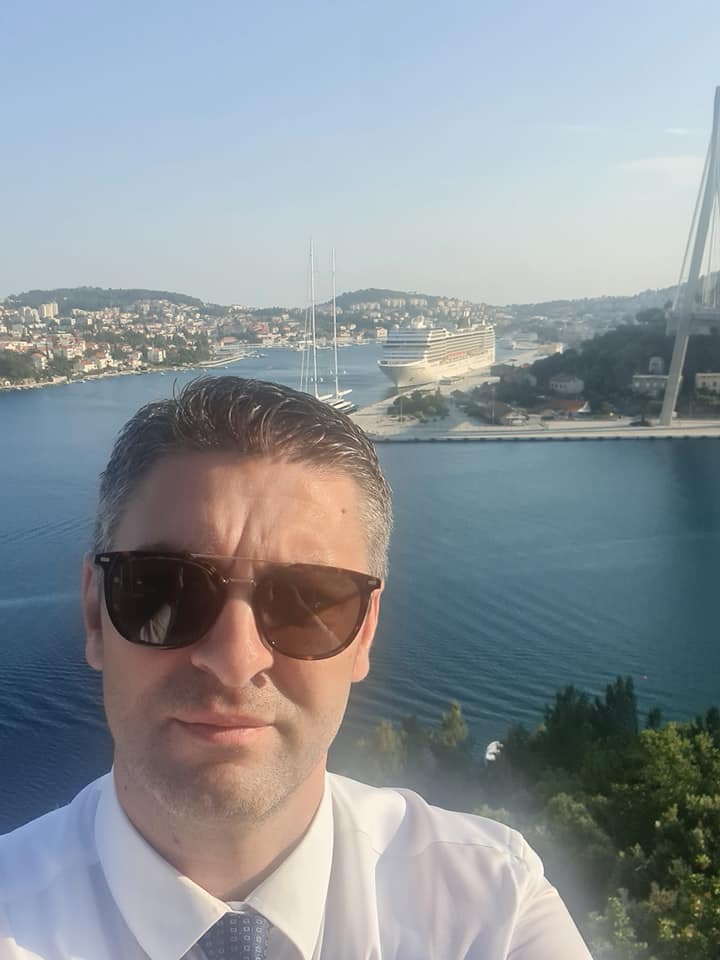
Source: Mato Frankovic / Facebook
Dubrovnik’s love/hate relationship with modern day cruise ships has been an ongoing state of being for the last couple of decades or so. The cruise ship industry brought to the city a quick way of recuperating large numbers of guests after the Croatian Homeland war of the 1990’s, which left the city’s economy in a total shambles. Soon after the first ships started arriving back to Dubrovnik, it became clear that Croatia's southernmost city is a perfect short stop port for many. Cruise ships brought with them large number of guests and did wonders in prolonging the tourist season.
Of course, it’s not all good news. A large amount of people coming to the city for a short time means crowded streets and traffic jams once again, an old Dubrovnik problem. For many, the experience of Dubrovnik became lessened by the fact the movement along the main areas was at times very difficult. Overcrowding and the strain placed on the infrastructure became a real issue. Dubrovnik’s image of a pleasant destination perfect for longer stays is now under threat.
What’s Next?
With all this being said, it will be very interesting to see how cruise ships are going to fit into Dubrovnik’s tourism picture this year. There will be a few of them, most probably with reduced capacity and sales. This might be a unique opportunity to see whether cruise ships and Dubrovnik can finally settle their differences.
For more on travel in Croatia, follow TCN's dedicated page.
Ahead of ZDNW 2021, Answers to Zagreb Digital Nomad FAQs
June 11, 2021 - With 10 days to go before the start of Zagreb Digital Nomad Week, answers to some fequently asked questions.
How do I apply for the digital nomad permit?
The Croatian digital nomad permit came into effect on January 1, 2021, with an online application process launched on March 1, 2021. This allows non-EU/EEA nationals who fulfil the criteria to live and work in Croatia for a one-time 12-month period. You can see all the official conditions here.
You can apply for the permit online via the Ministry of Interior website here.
How long does the application take?
The application process is extremely recent, and there is not enough data yet to give accurate predictions. The quickest approval I am aware of is two weeks, while others have taken a couple of months. Two things which seem to slow things down are getting the background check confirmation from the home country police authorities, and the need for an apostille. Things seem to vary from applicants from country to country.
How many people have applied so far, where are they from, and how many have been approved?
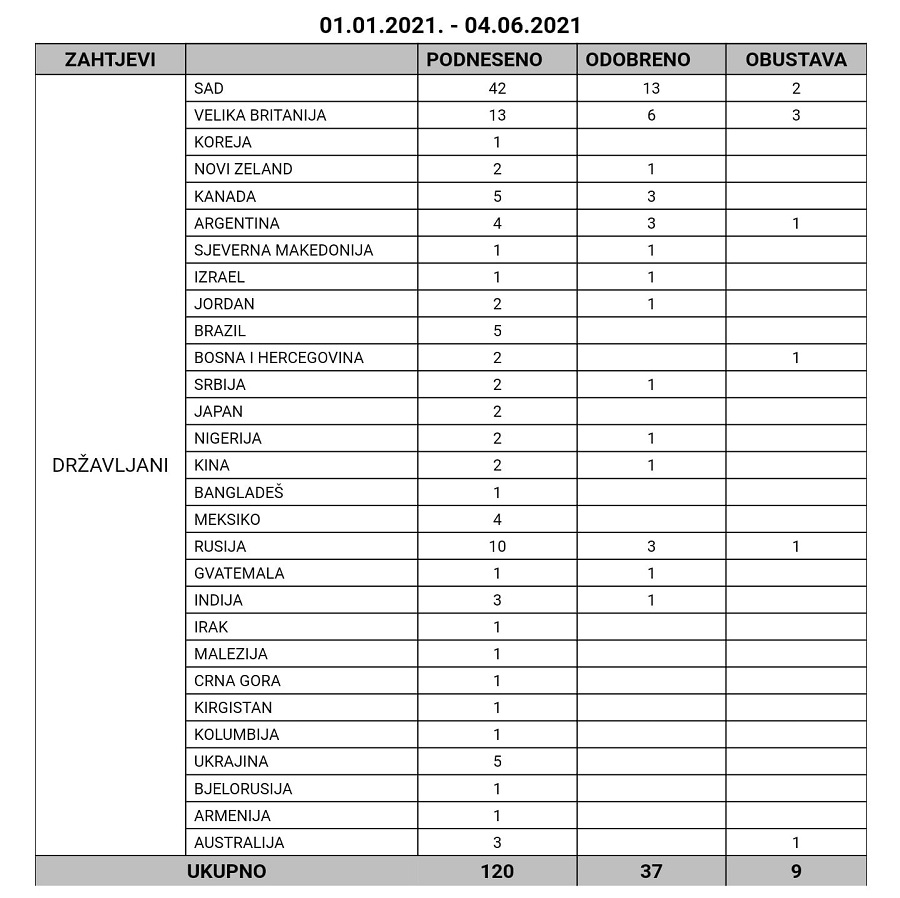
As of June 10, 2021, there had been 120 application for the digital nomad permit, 37 of which have been a approved, 9 rejected/withdrawn, and the rest in process. The biggest number of applicants have come from the USA, UK and Russia. The number of applications should improve considerably once borders open fully and travel is less restrictive.
Do I need to apply from outside Croatia?
That depends on your personal situation. If you require a visa to enter Croatia, then yes (unless you get the visa, then enter and apply). Several nomads who can enter for 90 days have started the process from inside the country.
How do I prove my income?
The financial pre-requisite of the permit is that applicants either have proof of funds up to 202,890 kuna for the 12 months (plus 10% each for a partner and family member), or they can prove a monthly income of 16,907.50. Proof of income for the previous three months of this amount via bank statements is enough.
What about tax?
Digital permit holders are not subject to Croatian income tax during their stay, but there are, of course, plenty of other taxes. Kristina Grbavac from KPMG Croatia has been a strong supporter of the digital nomad initiative, and she gave a great tax overview in a TCN interview. You can contact Kristina directly via the KPMG Croatia website.
Are there co-working spaces in Zagreb?
Yes! The scene is developing quickly, with more co-working spaces being added monthly. Check out BIZkoshnica, HUB385, Impact Hub Zagreb, InstantOffice Zagreb, Matrix Office Park, Virtual Office Croatia, Wespa Spaces, and ZICER - Zagreb Innovation Centre.
Where can I go for information about the digital nomad scene in Zagreb?
There are some dedicated Facebook groups:
as well as
The Digital Nomad Association Croatia.
and the dedicated TCN section for digital nomads.
The Zagreb Tourist Board will soon be offering its own dedicated digital nomad section.
Is there a big digital nomad community in Zagreb?
In terms of organised community at the moment, I would say no, but things are changing rapidly. In terms of number of nomads living in the city, I would say that there are quite a number, and they are growing quickly. Croatia is 'in' as a digital nomad hot spot, and less restrictive travel will see a significant increase. It is only a matter of time until the community gets more organised.
Many nomads are heading to the Croatian coast and islands. Why Zagreb?
Zagreb and the coast are perfect parnters to showcase why Croatia is a fantastic nomad destination, based on safety, authentic experiences, and lifestyle. Digital nomads by definition are nomadic, and travel between the capital and the coast is natural.
As the biggest city in Croatia, Zagreb has an increasingly international feel. Its Austro-Hungarian heritage has echoes of Prague and Vienna, but at a cheaper price. Its parks and outdoor cafes are a joy to wander and linger, while the surrounding area is full of additional tourism options. You can learn more on the Around Zagreb website.
How can I check the Internet speed for a location in Zagreb?
Are there any simple pre-paid digital nomad products to get online in Zagreb?
Hrvatski Telekom has developed a special product for digital nomads without the need for bureaucracy or contracts. The prepaid SIM offers 7 days unlimited access of FLAT mobile data with 4G/LTE speed up to 600 Mbit/s. The price is 85 kuna (11 euro) and this can be topped up each week for 60 kuna. More details here.
How easy is it to find long-term accommodation in Zagreb?
Finding longer-term accommodation in Zagreb is much easier than on the coast, as the city caters to people renting for longer periods and not just tourist short-term lets. Additionally, the future of tourism is changing, with AirBnB reporting that some 25% of 2021 bookings so far have been for 28 days and more. This will naturally bring changes to the rental market. The Digital Nomad Association Croatia will be offering approved accommodation specifially for digital nomads.
How to meet people?
Zagreb is an extremely relaxed and social city, and it will not be long before you fall in love with the cafe culture. Conversations inevitably start up with people at the next table, and new friendships are made. New in town and looking to find fellow exapts? The Facebook group Expats in Zagreb Official is a great resource, with many locals and expats sharing their experiences, organising meetups, and helping new arrivals with information.
What about health insurance?
Digital nomads applying for the permit are required to have health insurance. This can be purchased abroad, or through the Croatian health system.
Is English widely spoken?
Absolutely. Croatians have among the best English-language skills in the EU, and you will have no problem communicating in Zagreb and beyond. The older generation are perhaps not as fluent, but visitors are surprised at the level of fluency. German is also widely spoken in Zagreb.
How safe in Zagreb?
Croatia is one of the safest countries in Europe, and many visitors comment on the safety in the city. There is very little crime, and single women can walk home late at night without problems. I know of several people in the Croatian diaspora who moved to Croatia from countries such as Australia and the United States, because Croatia was a much safer place to bring up their children.
Where can I find information about Zagreb Digital Nomad Week 2021 & Zagreb Digital Nomad Ambassador Project?
ZDNW 2021 will take place from June 21 - 27, 2021 in a variety of locations all over the Croatian capital. Online registration for the event will be available on the Saltwater Nomads website. Attendance, both online and in person, is free, but please be advised that physical attendance will be limited due to epidemiological measures.
ZDNW 2021 will have 7 themes over 7 days: cyber security, online presence, remote careers, wellbeing, the future of work, tax & finance, and explore Zagreb.
The Zagreb Digital Nomad Ambassador Project will run from July 1 to December 31, with 6 winners enjoying free accommodation for a month, working with the city to improve the Zagreb digital nomad offer. Want to apply?
For the latest news and features regarding digital nomads in Croatia, check out the dedicated TCN section.
'Theater by the Sea' in Split a Hit! Lora Summer Stage Program Continues with Musicals for Children
June 11, 2021 - The Lora summer stage in Split is a hit thanks to the new Theater by the Sea program! And you can bring your kids along to the next event.
On Sunday, June 20, starting at 5 pm, the 21st century Wolf and Little Red Riding Hood will arrive on the Lora summer stage for the new 'Theater by the Sea' program in Split. Namely, the children's theater starts with the play 'Mi o vuku,' reports Dalmatinski Portal.
"Did the evil wolf really eat Grandma, the three piglets, and seven kids? Or is Little Red Riding Hood a little too influenced by Facebook, Instagram, and television? The real truth will be found when Little Red Riding Hood and the Wolf finally meet face to face! And with plenty of laughter, infectious musical numbers, and instructive moment," the organizers announced.
The celebrated children's musical 'Mi o vuku,' they point out, is one of the best children's performances in recent years, filling halls throughout Croatia. It can also boast of dozens of sold-out performances at KD 'Vatroslav Lisinski'.
The organizers claim that this musical is special in many ways.
"Primarily because it brings children a musical form that they do not have the opportunity to meet often. The main role of the musical is played by the singer Bojan Jambrošić, who won all the hearts of viewers throughout Croatia with unforgettable performances and transformations in the TV show 'Your face sounds familiar,' while the talented Manuela Svorcan plays Little Red Riding Hood.
Director Robert Bošković, although young, has a great directorial history, including 'Troubadour' at the Split HNK. The text is Igor Weidlich, whose plays 'Političar', 'Who the f .. is Biba', 'Žuta minuta' are enjoyed by the people of Split.
"In addition to all this, this excellent theatrical play boasts numerous memorable songs and word games intended for educational entertainment, especially for the youngest, preschool children, and lower grades of primary school," they add.
They explain that the music itself plays with the theme of the classic fairy tales of the Brothers Grimm, placing them in the children's understandable context of the modern age and the technology it carries.
"This combination sheds new light on classic stories in the desire to teach children in a fun way the necessity of critical thinking, not just receiving information bombarded from all sides by electronic media and creativity, tolerance and a sense of justice," the organizers said.
For the last year, our little ones have not had the opportunity to attend theater performances, and it is because of them that 'Theater by the Sea' brings children's hit plays.
"Along with the excellent musical 'Mi o vuku,' which will open the children's theater on June 20 as part of 'Theater by the Sea,' we will soon receive performances by the best Zagreb children's theater Žar ptica and many others. Therefore, there is an opportunity for the youngest ones to observe the plays chosen for them while their parents, but also grandparents, drink coffee in peace on one of the most beautiful terraces in Split," added the organizers.
Free parking is provided for all visitors.
Tickets for the price of 40 kuna can be purchased at the box office in Lora every day, including Saturday and Sunday, from 5 pm to 9 pm, and online at www.teataruzmore.com and croatia-tickets.com. Information and reservations are available at 091 9720 540.
All information about the festival 'Theater by the Sea' is available on its official website.


